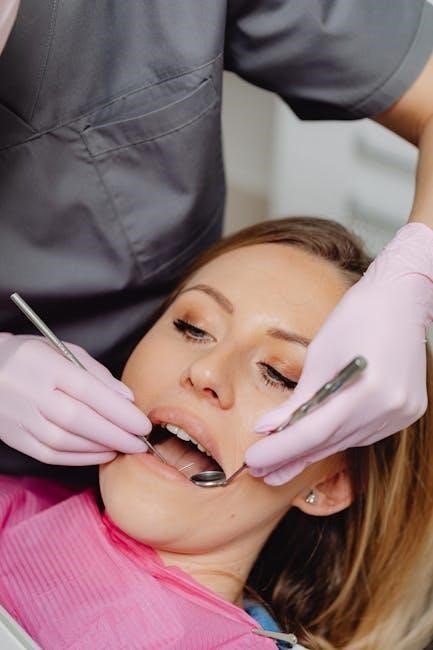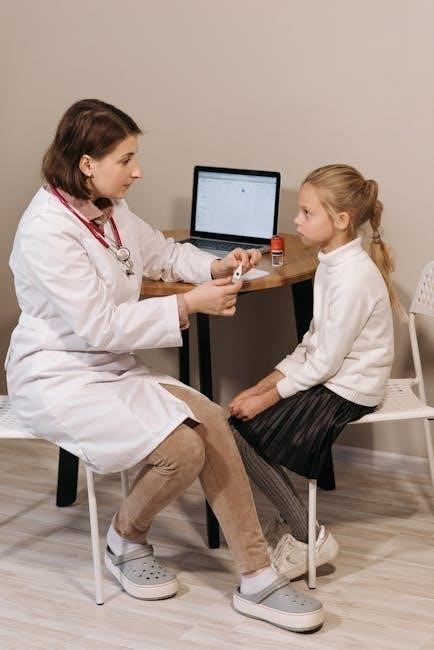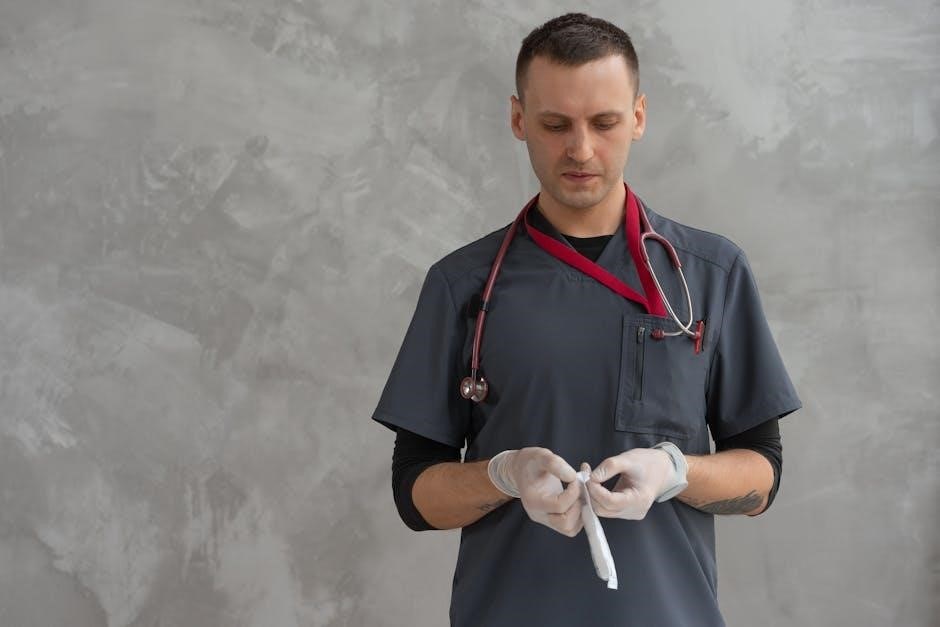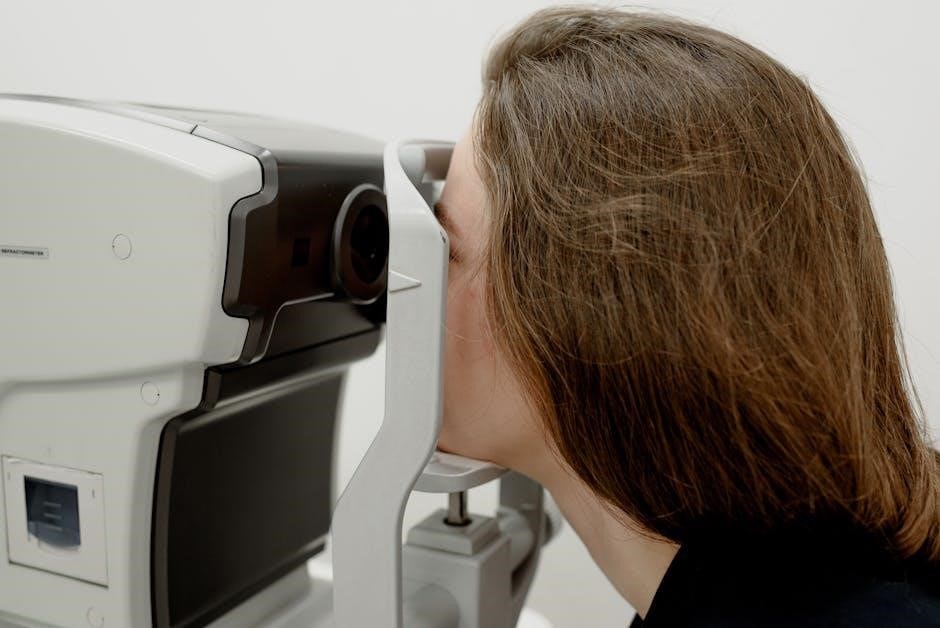This PDF guide provides comprehensive water treatment exam questions and answers, covering key topics like water quality standards, treatment processes, and operational calculations to aid exam preparation and professional development.
Overview of Water Treatment Certification
Water treatment certification is a critical credential for professionals ensuring safe and clean drinking water. It validates expertise in processes like coagulation, sedimentation, and disinfection, as well as operational calculations. Certifications are offered at various levels, from entry-level to advanced, catering to water treatment operators, engineers, and technicians. These certifications emphasize compliance with water quality standards, effective treatment methodologies, and regulatory requirements. By obtaining certification, professionals demonstrate their ability to manage water treatment systems efficiently, ensuring public health and environmental protection. The certification process typically involves passing rigorous exams, which test knowledge of waterborne contaminants, treatment technologies, and system operations.
Importance of Exam Preparation
Proper exam preparation is essential for water treatment certification exams, as it ensures a thorough understanding of key concepts like water quality standards, treatment processes, and operational calculations. Adequate preparation boosts confidence, reduces exam anxiety, and helps candidates perform at their best. It also familiarizes them with the exam format, including multiple-choice questions, true/false statements, and short-answer sections. By reviewing practice questions and answers, candidates can identify knowledge gaps and focus on areas needing improvement. Effective preparation not only enhances technical skills but also ensures compliance with regulatory requirements, making it critical for professionals aiming to excel in water treatment roles and contribute to public health and environmental safety.
Structure of the PDF Guide
The PDF guide is organized into clear sections, starting with an introduction to water treatment exams, followed by key concepts such as water quality standards and treatment processes. It includes multiple-choice questions, true/false statements, and short-answer sections to cater to different exam formats. Operational calculations and practice questions on topics like coagulation, sedimentation, and disinfection are also featured. Advanced topics such as reverse osmosis and wastewater treatment are included to ensure comprehensive preparation. The guide concludes with exam tips, recommended resources, and practice tests, making it a valuable tool for both beginners and experienced professionals aiming to excel in water treatment certification exams.

Key Concepts in Water Treatment
This section covers key concepts such as water quality standards, treatment processes, and common waterborne contaminants, ensuring a solid foundation for understanding and exam readiness.
Water Quality Standards
Water quality standards are critical for ensuring safe drinking water and environmental protection. These standards, often set by regulatory bodies like the EPA and WHO, define acceptable levels of contaminants and parameters such as pH, turbidity, and microbiological content. Understanding these standards is essential for water treatment professionals, as they form the basis for treatment processes and compliance. Exam questions frequently test knowledge of specific standards, such as maximum contaminant levels (MCLs) for substances like lead, arsenic, and E. coli. Familiarity with these benchmarks is vital for designing effective treatment systems and ensuring public health safety. This section provides detailed insights and practice questions to master water quality standards.
Water Treatment Processes
Water treatment processes are essential for removing contaminants and improving water quality. Common methods include coagulation and flocculation, which remove suspended particles, and sedimentation, which separates solids from water. Filtration further purifies water by passing it through media like sand or membranes. Disinfection, often using chlorine or UV light, eliminates pathogens. Advanced processes like reverse osmosis and ion exchange address specific contaminants. Understanding these processes is crucial for water treatment professionals, as exams frequently test knowledge of their principles, applications, and operational parameters. The PDF guide provides detailed explanations and practice questions to help master these critical water treatment technologies and ensure effective system operation.
Common Waterborne Contaminants
Common waterborne contaminants include bacteria, viruses, parasites, heavy metals, nitrates, and pesticides. These contaminants can cause health issues like waterborne diseases and long-term health effects. Bacteria, such as E. coli, and viruses, like rotavirus, are harmful pathogens. Parasites, including Giardia and Cryptosporidium, can lead to severe gastrointestinal illnesses. Heavy metals, such as lead and arsenic, are toxic even at low concentrations. Nitrates and pesticides can affect human health and ecosystems. Understanding these contaminants is critical for water treatment professionals, as exams often test knowledge of their identification, removal methods, and health impacts. The PDF guide provides detailed explanations and practice questions to help address these challenges effectively;

Common Exam Questions in Water Treatment
This section highlights multiple-choice, true/false, and short answer questions frequently appearing in water treatment exams. Topics include coagulation, disinfection, and operational calculations, ensuring thorough exam preparation.
Multiple Choice Questions
The PDF guide includes a wide range of multiple-choice questions that cover essential topics in water treatment. These questions are designed to test knowledge of water quality standards, treatment processes, and operational calculations. Examples include questions on coagulation, sedimentation, filtration, and disinfection processes. Each question provides clear options, allowing candidates to demonstrate their understanding of key concepts. The format mimics real exam conditions, helping candidates familiarize themselves with the structure and content. Additionally, the guide offers detailed explanations for correct answers, enabling learners to identify gaps in their knowledge and improve their problem-solving skills. These questions are invaluable for effective exam preparation and professional development in the water treatment field.
True/False and Short Answer Questions
The PDF guide features a variety of True/False and short answer questions designed to assess comprehension of water treatment principles. These questions focus on fundamental concepts, such as water quality parameters, treatment technologies, and regulatory standards. True/False questions test basic knowledge, while short answers require detailed explanations, ensuring candidates can articulate their understanding. Topics include processes like coagulation, filtration, and disinfection, as well as operational aspects like chemical dosing and equipment maintenance. The answers section provides clear explanations, helping learners verify their responses and improve their grasp of critical concepts. These questions are ideal for reinforcing knowledge and preparing for certification exams.
Operational Calculations
Operational calculations are a critical component of water treatment exams, focusing on practical applications of mathematical principles. The PDF guide includes exercises on detention time, flow rate calculations, and chemical dosing to ensure proficiency. These questions address real-world scenarios, such as determining the correct amount of coagulant to add or calculating filtration rates. Detailed solutions are provided to help learners understand the step-by-step problem-solving process. Mastery of these calculations is essential for water treatment operators to maintain efficient and safe plant operations. The guide emphasizes common formulas and their applications, making it an invaluable resource for exam preparation and professional competency.

Practice Questions and Answers
This section provides a variety of practice questions covering key topics in water treatment, such as coagulation, sedimentation, and disinfection. Detailed answers and explanations are included to help learners understand concepts and improve exam performance. The questions are designed to simulate real exam scenarios, ensuring comprehensive preparation for certification tests. By practicing these questions, candidates can identify knowledge gaps and strengthen their understanding of water treatment processes and operations.

Coagulation and Flocculation

Coagulation and flocculation are critical processes in water treatment that remove suspended solids and contaminants. Coagulation involves adding chemicals to neutralize charges on particles, while flocculation combines these particles into larger clumps. The PDF guide includes practice questions on these topics, such as identifying coagulants, understanding flocculation mechanisms, and calculating dosages. True/false questions assess knowledge of process differences, while multiple-choice options test application scenarios. Short-answer questions require explaining factors affecting coagulation efficiency. These exercises ensure mastery of chemical treatment principles and operational best practices, preparing candidates for certification exams and real-world applications in water treatment plants.
Sedimentation and Filtration
Sedimentation and filtration are key processes in water treatment that improve water quality by removing suspended particles. Sedimentation allows particles to settle, forming sludge, while filtration uses a medium to catch remaining particles. The PDF guide offers multiple-choice questions on basin design and filter types. True/false questions evaluate system effectiveness, and short-answer questions require calculations like retention times and head loss. Operational aspects, such as backwashing, are also covered. These exercises help operators master sedimentation and filtration, ensuring efficient and effective water treatment processes.
Disinfection and Chlorination
Disinfection and chlorination are critical processes in water treatment for eliminating pathogens and ensuring water safety. The PDF guide includes multiple-choice questions on chlorine dosage calculations and disinfection by-products. True/false questions assess understanding of chlorination effectiveness and safety protocols. Short-answer questions cover residual chlorine testing and contact time requirements. Operational calculations focus on determining chlorine feed rates and maintaining optimal levels. These exercises help water treatment professionals master disinfection principles, ensuring compliance with water quality standards and public health protection.

Water Treatment Exam Preparation Tips
Effective exam preparation involves utilizing practice tests, study guides, and time management strategies. Understanding the exam format and leveraging resources like AWWA guides ensures comprehensive readiness and success.
Study Materials and Resources
Essential study materials for water treatment exams include AWWA certification guides, practice tests, and online resources. These materials cover key topics like water quality standards, treatment processes, and operational calculations. Utilizing PDF guides with multiple-choice questions, true/false statements, and short answers helps reinforce understanding. Additionally, industry-specific documents, such as the Surface Water Treatment Practice Quiz, provide real-world scenarios and practical insights. Online platforms offering quizzes and detailed solutions are also valuable tools for self-assessment and improvement. Leveraging these resources ensures a well-rounded preparation strategy, enabling candidates to confidently tackle the exam and advance their professional skills in water treatment operations.
Time Management Strategies
Effective time management is crucial for success in water treatment exams. Allocate study sessions based on topic difficulty and exam weightage. Prioritize understanding key concepts over rote learning. Utilize practice exams to simulate real test conditions, helping to improve speed and accuracy. During the exam, quickly skim through questions to identify easier ones first, ensuring maximum points. Allocate specific time limits for each question to avoid overthinking. Review answers systematically to catch errors. Focus on understanding common question patterns and operational calculations. By organizing study time wisely and staying calm during the exam, candidates can optimize their performance and achieve better results.
Understanding Exam Format
Understanding the exam format is essential for effective preparation. Most water treatment certification exams include multiple-choice questions, true/false statements, and short-answer sections. Operational calculations and scenario-based problems are also common. Familiarize yourself with the distribution of question types and their weightage. Practice exams can help you adapt to the format, ensuring you manage your time efficiently. Skim through questions to identify easier ones first, allowing you to secure initial points quickly. Review your answers systematically to avoid mistakes. Recognizing the exam structure and question patterns improves confidence and performance. This knowledge enables targeted study and strategic test-taking, leading to better outcomes.

Advanced Topics in Water Treatment Exams
This section covers advanced topics such as reverse osmosis, membrane processes, and wastewater treatment basics, essential for understanding complex water treatment systems in exams.
Water Softening and Ion Exchange
Water softening involves removing ions like calcium and magnesium that cause hardness. Ion exchange systems use resins to swap hardness ions for sodium or potassium. This process reduces scaling in pipes and appliances, improving water quality for domestic and industrial use. Common methods include salt-based softening and salt-free alternatives. Understanding the principles of ion exchange is crucial for addressing water hardness issues effectively. Exam questions often focus on the mechanisms, benefits, and limitations of these technologies. Practical applications and troubleshooting scenarios are also key areas of assessment, ensuring operators can manage and maintain water softening systems efficiently.
Reverse Osmosis and Membrane Processes
Reverse osmosis (RO) is a widely used membrane filtration process that removes dissolved solids, bacteria, and other contaminants from water by applying pressure to force water through a semipermeable membrane. Membrane processes, including ultrafiltration and nanofiltration, play a critical role in water treatment by providing effective filtration at the molecular level. These technologies are essential for producing high-quality drinking water and are commonly used in both municipal and industrial applications. Exam questions often explore the design, operation, and maintenance of RO systems, as well as their advantages and limitations. Understanding membrane fouling, cleaning, and replacement is also a key focus, ensuring operators can troubleshoot and optimize these systems efficiently.
Wastewater Treatment Basics
Wastewater treatment involves physical, chemical, and biological processes to remove pollutants and contaminants from water before discharge. The treatment typically includes three stages: primary, secondary, and tertiary. Primary treatment removes large solids and grit through screening and sedimentation. Secondary treatment uses biological processes to break down organic matter, often employing activated sludge or trickling filters. Tertiary treatment includes advanced filtration or disinfection to meet stringent effluent standards. Exam questions often focus on understanding these processes, sludge management, and the importance of maintaining water quality. Familiarity with regulatory standards and operational best practices is crucial for effective wastewater treatment and safe environmental discharge.

Water Treatment Exam Resources
This section highlights essential resources, including study guides, practice tests, and industry-specific materials, to aid in preparing for water treatment certification exams effectively.
Recommended Study Guides
Several recommended study guides are available to help candidates prepare for water treatment exams. These guides include comprehensive resources such as multiple-choice questions, true/false statements, and operational calculations. They cover essential topics like water quality standards, treatment processes, and common contaminants. Many guides are developed by industry experts and organizations like AWWA, ensuring accuracy and relevance. Additionally, some guides offer detailed explanations for answers, helping learners understand complex concepts. Popular options include the AWWA Water Treatment Exam Guide and the Water Treatment Operator Study Manual. These materials are designed to enhance knowledge retention and exam readiness effectively.
Online Practice Tests
Online practice tests are invaluable resources for preparing for water treatment exams. These tests often feature multiple-choice questions, true/false statements, and operational calculations, mirroring actual exam formats. Platforms like Sylaps and AWWA offer practice tests covering topics such as coagulation, sedimentation, and disinfection. Many tests provide immediate feedback and detailed explanations, helping candidates identify weak areas. Some resources also include timed exams to simulate real test conditions. Utilizing these tools enhances problem-solving skills and boosts confidence. They are particularly useful for understanding complex concepts like water softening and membrane processes. Regular practice with these tests ensures thorough preparation for certification exams. They are accessible, convenient, and tailored to meet specific exam needs.

Industry-Specific Materials
Industry-specific materials are tailored to address the unique needs of professionals in various water treatment sectors. These resources often include guides, manuals, and practice exams designed for municipal, industrial, or environmental water treatment roles. For example, the Michigan Department of Environment, Great Lakes, and Energy provides sector-specific practice exams for drinking water operators. Similarly, AWWA offers study guides that align with the requirements of water treatment professionals in different regions. These materials ensure that candidates are well-prepared for the challenges specific to their field, covering topics like wastewater treatment basics and advanced filtration processes. They are essential for targeted exam preparation and professional development in specialized areas of water treatment.